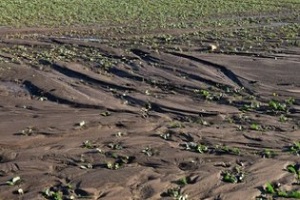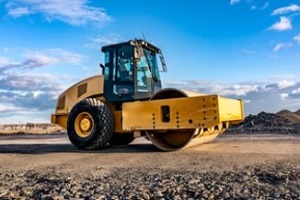 Soil compaction is a process that has been used to improve construction projects for many years. Although the preferred equipment for compaction has changed with advancements in equipment design, the process remains essential for protecting the integrity of soil that will serve as the base for structural projects.
Soil compaction is a process that has been used to improve construction projects for many years. Although the preferred equipment for compaction has changed with advancements in equipment design, the process remains essential for protecting the integrity of soil that will serve as the base for structural projects.
The purpose of soil compaction is to densify the soil by reducing its void space. This refers to the amount of air that is found between the particles of the soil. Soil compaction achieves this by pressing soil particles together, which reduces the space between them. This leads to highly compacted soil that has a higher unit weight than soils that are not compacted.
Why Is Compacting Soil Necessary?
Soil compaction is a relatively low-effort and affordable step that can avoid major problems in the future. Here is a look at some of the top reasons soil should be compacted.
It Reduces Settling
The process of soil compaction reduces the likelihood that the land will settle after something has been constructed on it. It is particularly useful if a structure such as a highway, parking lot or building will be constructed on it as premature pavement failure could lead to expensive and time-consuming repairs as well as damage.
Creating a strong soil base to serve as the foundation for any type of project is essential. The effects of improperly compacting soil are usually quite obvious. A buckled driveway, cracks in foundations and puddles in yards due to poor drainage are just some of the negative results that can occur when soil is not compacted correctly.
It Raises the Soil’s Bearing Capacity
In addition to preventing dangerous settling, it also raises the bearing capacity of the soil, which is the maximum amount of contact pressure it is able to handle before shearing. This is particularly useful for structures such as a footing or foundation or slabs for sidewalks, steps or driveways.
Moreover, reducing voids in the soil lowers the chances that the soil will expand, shrink or settle, and it reduces the type of water seepage that may lead to shrinking or swelling soil that would compromise structures that are built on top of it.
It Lowers Soil Permeability
Another benefit of soil compaction is that it lowers its permeability. This means that it will be more difficult for water to flow through it because the spaces between the particles are decreased. Therefore, the soil is able to hold more weight and has greater durability. This also allows it to resist damage due to frost.
It Stops Damage From Erosion
 Another issue that soil compaction can prevent is sliding of soil, which could allow water to pass beneath a foundation’s surface. This movement can cause damage to foundations in the form of erosion as well as additional uplift pressure, potentially putting a building at risk of collapsing.
Another issue that soil compaction can prevent is sliding of soil, which could allow water to pass beneath a foundation’s surface. This movement can cause damage to foundations in the form of erosion as well as additional uplift pressure, potentially putting a building at risk of collapsing.
Other Situations Where Soil Compaction Is Important
It is also important for soil to be compacted after it has been used for backfilling. For example, when a swimming pool is removed from a home and the cavity is filled, the area must then be compacted to avoid causing future damage to the yard and whatever is built on the land where the pool once stood.
In addition, any time that soil in its natural state has been disturbed, compacting is recommended.
How Is Soil Compaction Measured?
Soil compaction is often listed as a percentage. For example, 95 percent compaction is typically used as a target to ensure that a construction project is being built on a solid platform. Soil that has 95 percent compaction has been compacted to 95 percent of the soil’s possible density.
A lab can determine the maximum dry density and optimum moisture content of the soil. A threshold is often provided by a designing engineer and is based on the bearing capacity that will be needed to provide the final load with structural stability.
What Type Of Equipment Is Used For Soil Compaction?
When soil compaction first became a popular approach, steam rollers were the equipment of choice. However, modern equipment for soil compaction comes in a range of styles with different options, such as vibratory mechanisms, dozer blades, and single or double drums.
Static or vibratory force is typically used to carry out compaction. Static force uses the weight of the machine for compressing soil, while vibratory methods will rely on mechanically-driven force to get results.
The right equipment to use for a particular project will depend greatly on the soil’s properties as well as the amount of soil that needs to be compacted. Every type of compaction equipment, however, will raise the density of the soil, which causes its bearing strength to increase.
Smooth Rollers
A smooth roller will use static pressure to compact soil, and this is sometimes supplemented with vibration and impact. These are particularly popular tools for the final compaction step to leave a smooth surface for construction.
Pneumatic Rollers
 On soils that are mainly composed of gravel or a small to medium soil compaction job, a pneumatic roller might be used with staggered rubber tires and varying air pressure. These units use ballast systems that allow weight to be raised or reduced as needed to achieve a precise level of compaction. In addition, tire pressure might be changed in order to ensure the right level of compaction.
On soils that are mainly composed of gravel or a small to medium soil compaction job, a pneumatic roller might be used with staggered rubber tires and varying air pressure. These units use ballast systems that allow weight to be raised or reduced as needed to achieve a precise level of compaction. In addition, tire pressure might be changed in order to ensure the right level of compaction.
Tamping
Tamping foot or padfoot rollers use manipulative force to break down the natural bonds between particles of soil to provide a better level of compaction. This is particularly useful in cohesive soils. The tapered feet of the rollers ensure that the soil does not get fluffed, which would increase its ability to absorb additional water if it rains.
Tamping Rammers
In a confined zone, a tamping rammer may be used to densify soil. These portable, lightweight units can quickly apply consecutive impact to soil for rapid results in a small space.
Get In Touch With Dirt Connections
If you need structural fill dirt for an upcoming project in the Northern Virginia area, get in touch with our Virginia topsoil experts at Dirt Connections to learn more about our services.
Summary

Dirt Connections was started with one goal in mind: providing quality residential and commercial construction services to clients on time and on budget. Reach out for more information on how we can support your next project.
For your convenience our estimates are free and by appointment. Call 703-940-9949 for a free estimate today!









































